#on and makes fun of it for the majority of its runtime
Explore tagged Tumblr posts
Text
sorry ive posted forty thousand posts about our show in a row. i will do it again
#xanadu posting#what else do i want to talk about#OH#almost the whole cast went and saw the barbie movie yesterday#we ALL wore pink at it was SO COOL#the barbie movie has a WEIRDLY similar plot to ours#stop reading here for barbie movie spoilers#but like. xanadu? set in venice beach/los angeles with neon singing and rollerskates#barbie movie:#xanadu: has a main plotline about an immortal blonde girl who loves pink going to los angeles and meeting a person she ends up leaving her#-fantastical world behind for#giving up her immortality in order to be human and experience life with those she loves#barbie movie.#xanadu: comedy with fourth wall breaking galore and a lot of absurd and out of the blue comedy that references the source material its base#on and makes fun of it for the majority of its runtime#THE BARBIE MOVIE.#alright anyway you can copy my homework just change it a little! /j
6 notes
·
View notes
Text
what bugs me most about the pjo show is that i know they could’ve done better. i knowwwww they could’ve been as faithful as they wanted to the books. for anyone saying “oh, but it’s an adaptation! it isn’t meant to be the same so stop whining that they took stuff out or that they’re adding things in different order!” well yes, i agree that adaptations aren’t meant to be a carbon copy of the source material for the simple fact that it’s adapting the source material into a different medium (television), yet it’s just that! a form of adapting the things that are unable to be channeled from, say, a book—or on the contrary, adding things that make sense for television but couldn’t be channeled into the books otherwise…all of this in a faithful manner. a good adaptation is one that stays true to the source material by properly adapting its themes, characters, symbolism, context, pacing, and the overall story/plot so as to not only be seen as a sort of love letter to the fans, but also to reach a wider audience.
just look at the hunger games! the movies are so faithful to the books to the point that most of the scenes are taken straight out of the books, dialogue and all. and they’re movies, aka less runtime than a freaking tv show and they still did it better. did the hg movies have to take a few scenes out? yes; they have only so much time to tell the story as it is told in the books. did they resume things, like the games themselves? also yes. but did most of the important scenes and character moments stay in the movies? also also yes. again, THESE ARE MOVIES!!!!! a medium much more limited than a freaking tv series with multiple episodes that have enough run time to add even more scenes from the books than what could be possible in a 2 hour (max) movie!!!!!!!!!!!!!
and yet they STILL changed so much that rly had no business being changed other than that the writers decided they felt like it because…..a lot of it im not even sure. and the worst thing of it all is that freaking rick riordan took part in script writing yet so much of the source material has been watered down???? they make a whole ass episode about a monster fight with the majority of the scenes from said episode not even present in the books instead of sticking to the perfectly good source material???? and by doing so they delete the small details that are very much integral to character development and plot???? huh???? the math isn’t mathing. don’t get me wrong, i do like some changes, but then i think: at what cost do they add these things when there was a perfectly good narrative without it? like, at what cost do we get the whole turning to gold sacrifice scene if they’re gonna take out all the fun details that make the lightning thief the lightning thief? for example the silly water park merch and then annabeth displaying her spider phobia and her mortification at going to the thrill ride of love with percy and then being broadcasted to olympus. this is just one episode, but they’ve been doing it in all of them. and u know, it’s not that i don’t hate-hate most these changes. again, what bugs me is that this was supposed to be a faithful adaptation. again, it’s a tv series, with so much more time to develop everything from the books. rick is behind it, who apparently hated the movies for how unfaithful they were. the cast is great. and yet…the script is so mediocre. the spark is lost. character traits are looked over in place for weird pacing and even weirder changes. if the hunger games could do it, then surely a pjo tv series could as well? apparently not? i really really Don’t Get It.
#pjo adaptation#pjo tv show#pjo tv crit#i wanted to Not Talk about the show but i have so much to say#i’ve given up i’ll keep ranting
569 notes
·
View notes
Text
"It was fun, but it got a little boring by the end" is perhaps the most common review of Veilguard's combat that I've seen. No one seems to have strong opinions about it, overall. As far as things to have beef with this game over, it doesn't even make the shortlist, really. I mean, it was fine.
But hell, I'm not above being petty, especially when it comes to this game. So amidst all the other things wrong with this game, here's my hot take: Bioware doesn't understand RPG combat, and why it's useful in, you know, RPGs, as they ostensibly claim to make.
This didn't start with Veilguard, though Veilguard is obviously the subject of this post. It was apparent since before DAI that they were gravitating towards action combat, and I had a lot of problems with Inquisition's system at the time. But Veilguard took it even further, doubling down on their pivot away from RPG mechanics. And, well, I don't think a proper RPG system could've saved this game. But it could've given the game something it desperately lacks - replayability.
RPGs are long games, are driven by the premise that most players will not follow the exact same path towards the end, and above all, are designed to be played in as many ways as possible. This is why character classes exist; why there are multiple weapons to choose from, and why there are more party members to pick from than can fit in your party at once. This works when you consider the other hallmarks of RPGs: different story paths, dialogue choices, and romance options. Variation outside of combat compliments variation within it, and this makes a good RPG something you can play several times and have a completely different experience each time.
And more than that, the mechanics of an RPG compliment a game that could take anywhere from 80-100 hours to complete. You NEED that level of choice within the game mechanics to get you through that long a game, and Veilguard's problem is that it has the length of an RPG, but the combat system of your average 30-40 hour action game.
Of course, there are excellent action games out there that are also up in the 100-hour range, but what these games do that Veilguard did not, is put the majority of focus on their combat systems. Elden Ring is probably the best example of this, but of course we wouldn't want a Dragon Age that's like Elden Ring, really - Dragon Age needs to have more going for it than just combat. And if you can't build your whole game around its combat system, then you need something that has the longevity to sustain a 100-hour runtime.
Everyone bemoaning the lack of direct companion control is absolutely correct - their lack of damage output and usefulness compared to the player renders them basically meaningless in combat. But what this also does is make any kind of customization of their abilities or their gear next to pointless. Even if you could replay this game and build them differently - which you can't, let's be clear - doing so would not make a single iota of difference in combat.
And Rook themselves - well, consensus is that the game starts to get boring about 40 hours in. That's roughly the place where you've gotten enough skill points to specialize in one thing, and though, sure, you could theoretically refund all your points and try something else, by that time you've gotten enough points to acquire all the skills in the general tree anyway. It doesn't help that the gear system is such that whichever items you happen to get early will probably be the ones you end up sticking with. It definitely doesn't help that the enemies in this game severely lack variation, and once you've fought one dragon, you've fought them all.
You know what would have helped? Giving people multiple ways to approach combat. Giving us enemies that require a different approach. Giving us companions that you can build out in interesting ways. Giving us, in short, a reason to play this game again. Because if you're going to create an 80-100 hour game that has very little else going on mechanically, then the very least you can do is make sure your combat is actually fun for the full 100 hours.
52 notes
·
View notes
Text
I try to avoid bringing it up too often, because I know the maws team would give us more if it were up to them and I know everyone always brings it up, but I REALLY wish this show had more episodes. There's so much to juggle with the character development and the fun quips while also giving Clark a big bad to fight against. And the maws team does SO WELL with the time that they have, choosing to spend a decent chunk of the runtime with regular everyday Clark and managing to make it charming as all hell, including countless small nods to the comics, all the tiiiinnyyy little animation details that only show for a couple frames, and somehow managing to make all of the small side characters feel full of life and personality despite the extremely limited screentime. But despite how well the maws team has done at working with the time they were given, I still wish we had a bit more time to sit with the emotions that the characters are going through. The show tries to have a slow build on most of the major emotional development and I think they do it well (and a lot of it is still ongoing so maybe I'll change my mind once plotlines are resolved), but it still feels like they don't get that much time to process the major emotional events, like lois' dad leaving, before we have to get back to the plot. And again the maws team does SO WELL with trying to weave in little lines that hint at where the characters are at right now. But it makes me wish we could have more full scenes dedicated to the emotional development in between major emotional moments, not just a line or two. I know it just got greenlit for season 3 and I am completely and wholeheartedly over the moon about that, but I'm always scared that one day the execs are going to decide maws isn't worth it and cancel the show before its time for it to end (there is, after all, major precedent for that exact thing happening far too often in tv these days) which is another part of why I wish we could have longer seasons, so that I can have more faith that the maws team will have the tools to take this story where it needs to go and only end it once they've said what they needed to say.
#and now im sad#i also feel the need to knock on wood now. please knock on wood with me i cant have this show cancelled#my thoughts#my adventures with superman#maws
48 notes
·
View notes
Text
Just finished up Jentry vs this morning and HOLY CRAP was that ending something.
*NO SPOILERS FOR THE SHOW*
Review under cut
Action and high school romance doesn’t tickle my brain as much as slice of life genres do, but I admit the art direction and incorporation of Chinese mythology is astronomical compared to other shows of its nature-
You can tell the artists had fun attempting to flesh out every visual aspect of the show. If you love animation / haven’t seen this show yet / or aren’t sure if you’ll like it, just check in for the action sequences!!! 10/10 Really cool animation 🔥
Again no spoilers, but I really wish there was a bit more “filler”, so I could get to know the characters a bit more. The show is so plot driven that I unfortunately didn’t care for the characters as much by the end. Some actions were also quickly forgiven, while other conflicts were a bit too stretched out or flat out frustrating to watch.
The first few episodes are rough pacing-wise, but that’s to be expected for a show with such a short runtime. There’s so much to unpack with Jentry’s world, and I feel as if a bit of breathing room would benefit the show. Maybe a 14/15th episode to flesh out the town, Gugu’s house pals (why do they exist again??), or maybe even a light ep about side characters. If only our lord and savior Netflix allowed for an extra ep or two… 13 is truly a blessing in animation though, so I do understand why the show feels the way it does.
There are also some red herrings- (I said no spoilers, so I won’t get too into it) such as certain characters, a life decision, their powers/identity (iykyk); which felt almost glossed over.
Someone out there might hate me for saying this (and I mean this in the most nice way possible), but VA wise, I truly wish Jentry was voiced by a teen or another person. Wong doesn’t do too bad of a job with Jentry, but I feel as if her performance lacks a certain nuance through a majority of the show.
She’s almost too awkward; lacking a confidence that a character like Jentry would have by the last episode. Wong almost does the same infliction with Bertie (Tuca and Bertie) as she does for Jentry, and it doesn’t make sense to me personally. The last ep though, GOOD GOD YOU GUYS GOT ME. 😭
I’ll do a deep dive if anyone wants more of my opinions of the show (I doubt anyone would, but such is life); but for now, I can truly say this would be a 7.9/10!! GO WATCH IT- LET ANIMATION THRIVE!!
#jentry chau vs the underworld#jcvtu#don’t tomato me#just because this isn’t my favorite show#doesn’t mean that it’s bad in any capacity#WATCH THIS STUFF#I don’t want another fricking big mouth#I want provoking narratives#I want MORE original things!!#kayenimate
10 notes
·
View notes
Note
What’s an unpopular opinion you have about clh? 👀
I could go for such low hanging fruit here and talk about Ramon and how much of a pedestal he’s put on within the fandom without actual analysis featuring source material references, and consistently going for the ‘Fanon Shadow The Hedgehog’ effect and how there’s only a handful of scenes that are discussed consistently and many of them are kinda irrelevant in the long run (ie… cow hooker. this is mainly about that. I mean it’s funny but it’s confusing how that’s considered important when there’s more to extrapolate from. And frankly… why not? We all have that one character or something that was handled so poorly and/or should not exist and I’ve seen many an essay about characters just scrolling through the tag and all of them have at least had something to think about.) (Also speaking of him and essays before my best friend raises her brow at this topic she is exempt from this because she’s actively done the research and does in fact get him out of this loop of the same three scenes whenever they ramble about him so. They’re excused.)
But if you want something kind of scathing I feel like Sarah’s breakdown is much more justifiable than people give it credit. Yes it’s ‘long’ (and it should be <3) and introduces so much lore very quickly in a way that was definitely impacted by a short runtime but. I don’t care. It does its job so damn well and it’s obvious as to what it says really, she’s literally a victim of the system herself and isn’t the spawn of Satan , she was just built up by propaganda (something that the fandom doesn’t tend to point fingers at Ramon for but uh. He was the messenger. I know he was forced to or whatever and also a victim of Eden because they literally saved his life when he nothing (and still went on to really despise everything except believing he was doing the right thing for the children when he literally made a dictator. I know he’s not exactly aware of that but! Hi, why do we not talk about that. Scared of admitting that your precious emo guy who could do no wrong is Literally a major contributing factor to things wrong? Or is it a dislike for Sarah for either a reason that could be argued against or is just reflective of some shitty views that you need to unpack? (also. this is becoming such a tangent but Dolph is right there, he has everything Ramon has; shitty coping skills, a gun, ‘sex appeal’, I mean I don’t get it, not into men as we’ve established but I understand it significantly more. Like he has all the makings of that character archetype so… why is it not okay when it’s him yknow? Like I know there’s so much more to both of them than that but they do often get boiled down to those specific traits and I really do wonder why it’s not okay when Dolph does it. It’s probably horrible views you need to unpack again I’ll be real. I could write an essay but I can’t lie I just woke up. Maybe one day?) Anyways back to the point, Sarah’s crash out was very well deserved in my opinion and I know the common takeaway is that she knows what’s happening but. No she does not, the defense was that she was only a child, which whilst being true is not full clarity. Full clarity would probably involve a further breakdown, not moving 5D chess pieces to create what ever she believes is the correct future because it’s everyone else around her who’s corrupt, are her methods fucked up? Yes. Is the intention fucked up… I really, I really doubt that but that goes into headcanon territory and not what we’re shown I’ll put a pin in that.
Also friendly reminder that Sarah literally hasn’t killed anyone on screen aside from Cody, that one member of Dedsec who I don’t particularly know (I have not played Watchdogs yet and it’s… pretty low priority for me at the moment due to college work and everything I’m playing for fun and things I’ve gotten heavily into via CLH sorry :() and Dolph(?) (we still don’t really know and technically he took himself out.), I know she’s the reason for multiple imprisonments, tortures and probable deaths but here’s the thing. (Also if she had more time she would have killed more people but shush I’m making a point) Jade, technically not her fault and she was… clearly dead after being shot by Pagan Min (which is ridiculous if you ask me. Oh right. The guys can survive explosions, the guys need to be rammed with lasers and countless bullets or have their brains severely damaged and yet Jade can’t survive one shot… ngl we’ve said it before but wow we do not like women in this household clearly 💀) and the bomb only went off because Dolph asked (and I have analysed all of the scenes post Jade’s death still related to Sarah and 😭😭😭 that’s also an entire essay topic but oh my god I love how that’s the only death she genuinely shows some kind of emotion over other than Sam because he was present this time 💀 also another essay topic but I need to get through more of SC first so I can create that argument in depth because that could be summed up quick but it’d do everyone involved a disservice and that was not a knock on Sam at all I like him, it’s just that the role reversal and lore comparisons go hard I think.) Uh. Pey’J got shot up by the police (as he should but not for the reason they used.) and Bullfrog nearly being executed had nothing to do with her. So whilst yeah, she could have absolutely killed them herself she didn’t, most likely because at the end of the day they were good assets.
On a more light-hearted note: Bullfrog is not ‘hot’, nor is he cute in the way I commonly see him being utilised. He’s adorable, sure, but not in this soft, almost uwu-ification way (I am never writing that again ew) by way of taking his entire identity as an Assassin away from him. Guys. He kills people. He is at least older than 40 years old (Wastelanders War. Which also begs the question of hybrid growth and age but that’s a question that’ll literally never really be answered in a canon capacity by much) he’s not a child. He is polite and respectful explicitly because that falls in line with the creed itself. (I’m not the lore expert on AC but a part of being an Assassin is in the way they carry themselves outside of a murderous context. He’s just a guy dedicated to his job who just so happens to be the most jovial person around yknow.
I’m aware that fandom flanderisation is going to happen to everyone to varying degrees it’s just very interesting in the way it happens because honestly I don’t think these should be majorly unpopular but then again. Interpretation is one hell of a thing.
#captain laserhawk#clh sarah fisher#… do I risk tagging the other two in case I get dogpiled?#No. No I think people will get it. Just because I say something about a fanon interpretation is bad doesn’t mean I hate the character pleas
19 notes
·
View notes
Text
On Puppets, Agency, and Fate
I’ve been writing this thinkpiece for around a week while looking further into Welcome Home’s symbolism through queer/neurodivergent lenses; strengthening my belief that its themes of freedom and fate cannot be separated from the struggles the characters face as queer/neurodivergent folks.
This writing is going to be a mix of canonical content and my personal interpretation as I make many connections to various readings. Not to mention that the story is very far from done according to the words of the creator himself, so please take the things I say with a grain of salt.
You can view this thinkpiece in Google Docs format here.
CW: mentions/discussions of homophobia, transphobia, ableism, and abuse
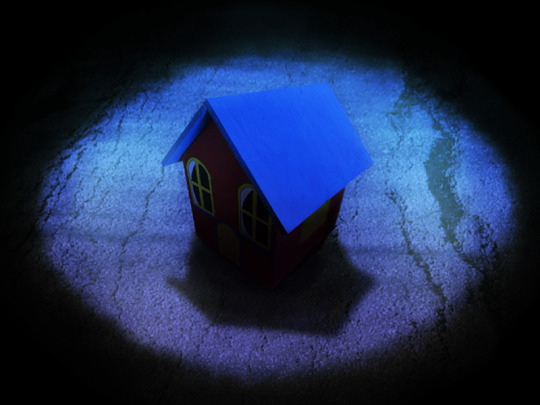
I've always adored explorations of humanity and their deteriorating, fluctuating psyche through characters constantly challenged by the narrative (example: Phos from Land of the L*strous, Kris from D*ltarune, Guts from B*rserk, Mae from N*ght in the W*ods) and how they struggle to find their place in the world and freedom. To progress, humanity has always desire freedom. Freedom of expression. Freedom to think. Freedom to honestly, unapologetically be who one wants to be. Humans and humanity are not always synonymous. Welcome Home is a case of this too, its ensemble cast consisting of puppets.
Clown has stated that themes of being queer/neurodivergent are very integral to the story in many aspects, from the characters to the metanarrative. I want to talk about the things I've noticed, the analogies they carry, and how every character's identity contributes to the themes or the story.
First off, the neighborhood.
The neighborhood in general
From the perspective of Welcome Home Puppet Show’s creators, the neighborhood is the idea of a perfect, idyllic community through the lens of cisheteronormavity from the 70s. It is something out of a children’s dream with the colorful imagery, the peaceful yet eventful neighborhood filled with fun activities where everyone in the neighborhood is happy and there are no realistic problems like capitalism, oppression, relationship problems, sickness, and death. Of course, it’s the given obvious because this is a puppet show we’re talking about. A show aimed at kids.


Everyone has a role to play in the neighborhood – the shopkeeper, the mailman, the baker, the bug nerd – they all fit the traditional, stereotypical, cartoonish American mold of what the dream urban life is like in the 70s (and it still is in my small hometown, in Indonesia! We’re quite traditional in a sense) especially with the lack of serious overarching threats of aforementioned human problems.
Welcome Home first aired on 1969 and abruptly ended on 1974. A possible theory is that they cannot keep up with the competitor shows at the time (Sesame Street started on 1969 and The Muppet Show started on 1974, fun fact!), but seeing the amount of merchandise they put out and the way it stood out from various angles, this theory can be thrown out the window. The “about” page for WHPS also describes the show as well acclaimed and doing well during its runtime.

Another one is that the sentience of the puppets (and their desire to have autonomy over their own lives) have possibly impacted the writing of the story, given how they have their own identity outside of the one given by WHPS’s writers to them. Even more when you take into consideration that WHPS is produced during the era when LGBT history in America is at a major turning point. As cited from The Atlantic:
“Those years that followed, the decade of the 1970s, represent a remarkable period of transformation for gays and lesbians, particularly those living in America's coastal cities. At its core, that transformation was about visibility. During those years, there was the first gay television movie (That Certain Summer); a sexy on-screen kiss between two men in Sunday, Blood Sunday; and the release of Cabaret, which has been hailed as the first movie that "really celebrated homosexuality.
There were gains in politics too: Edward Koch, then serving in Congress, "became one of the first elected officials to publicly lobby on behalf of the homosexuals of Greenwich Village," Kaiser writes. Gay Pride Week was established. Perhaps most significantly: In December of 1973, the board of the American Psychiatric Association* voted 13-0 "to remove homosexuality from its list of psychiatric disorders."
The laws that no longer criminalizes or dehumanizes queer folks are being written. Changes are made. Even when LGBT movement was going on a fairly optimistic path, oppression and bigotry towards the community was still rampant. After all, oppressors just can’t change their views in a whim! Their hatred comes from their own thoughts and not because the higher ups told them so.
I won’t turn this into a writing about queer history instead of focusing on Welcome Home. Though, I think it's all worth mentioning given the things I'm going to discuss here and how Clown stated that these themes will become prevalent throughout the story. I decide to write this thinkpiece as an outlet for my thoughts and how I connected many of the story's aspects to the themes of freedom – both from their status as puppets and their identity.
Now that the overview is out of the way, time to bring in the big guns.
The neighborhood and Playfellow Workshop
If we take Playfellow Workshop's involvement in the characters' lives outside of episode recordings, Welcome Home becomes a huge transgender allegory, wrapped in a neat colorful package called "being puppets whose view on the world is much more narrow and simple in which they are controlled by beings above their comprehension".
Playfellow Workshop is the company that creates WHPS and owns its characters. They act as the "parents" to the "children" – WHPS' characters – in this comparison. They house the characters, have them as their responsibilities and assets, and, as any show production goes, they most definitely have staff that takes care of the puppets to see if there are any rips or tears in their bodies, making sure they are fit for the show production. It's just like how parents house their children when they cannot afford housing or live on their own, taking care of (or rather monitor) them, giving them shelter and food.
They are controlled both literally and figuratively by Playfellow Workshop – former because they're hand puppets made for children's entertainment and latter because of their status binding them to their duties. Just like how a parent has authority over their children under the guise of “you live under my roof, you live under my rules.” The rules in questions are the episodes which are produced on story scripts, and the puppets follow said scripts.

Playfellow Workshop is extremely important to the puppets, whether the company is taking a positive role, a neutral role, or an antagonistic role. If the puppets were to break free from their grasp, who would take care of them? Who will place them onto their cases, or fix their rips and tears, or make sure they're in good shape? Playfellow Workshop may have taken a toll on the puppets, but no one can take care of the puppets better than Playfellow Workshop.
You might be wondering, “But Senja, this can be read as a typical controlling parent and clueless children dynamic. Why so specific about it being a trans experience?”
It can be read like the former! I made more connections and thus thought "Hm. This is so true to my trans experience".
There are multiple transgender characters in the story such as Frank, Poppy, and Julie. I was struggling on how to put my thoughts into words about the ways the producers of WHPS (could it be that they thought about the puppets not being cis?) can write in trans characters in WHPS, but I believe Clown himself and the wikipedia page for Gonzo from The Muppets said it best.
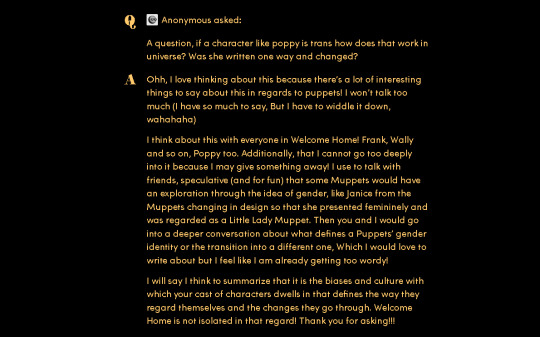

A similar case for the puppets can be applied to the trans characters of Welcome Home! Still, the way the puppets present themselves to the audience is also ultimately a decision made by Playfellow Workshop, especially during episode recordings. Clown also said that they won’t reveal much about it since he doesn’t want to give out spoilers. Perhaps regarding to the nature of Playfellow Workshop, too?
The puppets and the scripts can also be a stand-in for how trans folks who still live with authoritative adult figures (especially those that don't accept them or begrudgingly does) are handling autonomy over their own bodies and actions. Although not shown for now, I predict there’s going to be an eventual identity dissonance between who the puppets truly are and who the puppets are according to WHPS’ writers. It reminds me of my experience of when I was much younger, being a closeted trans person who often struggles with disassociation, looking into the mirror and feeling like me and my body are not one. Not myself. It's like they're two separate beings, "me" who is what I truly am, and "my body" that is dictated and dressed up by my parents. As much as I love my body, little me wanted to claw out and break free if it means I can have a semblance of independence over my life. (Things are much better these past few years, though!)
Again, I don’t like accusing Playfellow Workshop of purposefully mistreating the puppets or even taking pleasure in hurting them because we are just getting started; getting to know the personalities and character dynamics between each character. Authoritative parents won't exactly be abusive to their children. Maybe Playfellow Workshop is just doing their job. They take care of the puppets because if they're damaged, the show won't go on. They act indifferent towards the puppets because well, they're just puppets. No personal feelings. That's just how business goes.
We do know that Playfellow Workshop is a big problem regarding the WHPS’ cancellation and the puppets’ worrying fates.
Playfellow Workshop aside, what about the community regarding the puppets?
The neighborhood is a small town consisting of nine residents. Everyone knows each other, and it’s hard to keep secrets from one another with just how tight-knit everyone is; the experience of living in a small town rings true to mine. Almost everyone in my quaint hometown knows many details about each other and their families because our community strongly believes in the importance of bonds and our culture is built on the word "family".
The neighborhood is a family that does not fit the general criteria of what the traditional structure of a family is. There is no concrete "father" or "mother" or "siblings" assigned here – they're also not the typical found family where they meet one another by chance. They are placed inside the set by the creators of the WHPS, lives already decided by its writers (like a traditional family), but they find solace in each other, having their lives intertwined with one another through bonds that they also take part in building, even outside of the show's production (like a found family, as seen in the "answer" pages). They are friends. They are family. Not to mention how the neighborhood is called "Home", a place where a family lives.
But they also cannot get out – as in get out of WHPS instead of just the neighborhood. I will be covering connections to freedom for each character later on (Sally falling from the sky, Poppy as a flightless bird, Howdy as an adult caterpillar) but the way their existence is bound by the colorful stage sets and rainbow props can also be seen as a small analogy that traditional families are expected to always stick with each other no matter how bad things are.
Themes of family aside, I’ll talk about how the so-called “long lost and unknown of number” episodes. WHPS’ episodes start with Wally leading the viewers through the cacophony of the neighborhood. Then other characters join in, with many of them having notable activity segments. The episodes then end with Wally, who has finished journeying with the viewer, when the day has ended. It is most peculiar and harrowing that the agency of the puppets regarding the show is dependent on Wally and the time of the day. Wally plays the central figure of the story, first being placed in the position as the protagonist and most important character in WHPS, then having to act as their savior because he is the only puppet thus far that has contact with the restoration team and you, the viewer. He is akin to a child who has to take the lead as the head of the family even though he is not prepared for it.
Nobody remembers Welcome Home. Nobody remembers who the puppets are. At the time, the puppets only have themselves and each other to rely on for support. Then again, it’s not even clear if they are with each other when they went missing or scattered around.

Now that I've covered the connections I've made regarding the neighborhood as a whole, I’d like to analyze its residences one by one.
Wally Darling
Wally is a very complex character and by far the most – ironically – human out of everyone in the cast. The word "freedom" is written all over him and the word "love" is sewn into every inch of his body.
Wally is shown to show little to no interest in romance or dating. He allowed his friends to get touchy-feely with him (examples being sleeping with Barnaby and getting hugged by Eddie) and doesn’t hesitate to show his affections to them, but it’s been said that he never found them romantic. Wally’s lack of interest in romance gives me the impression that he is in the AroAce spectrum. Clown even mentioned that he doesn’t know what to do if someone confesses their love to him. Wally knows what romance is, he knows what romantic love is, he just doesn't see himself finding a partner anytime soon.

Wally's view on love not only ties into his queerness, but also his neurodiversity – his autism. He is not good at reading social cues or acting "as accordingly" to the situations presented to him. Clown also suggested that Wally cannot process emotions “the way humans do”. They also entertain the idea that Wally is “emotionless”; but I’d rather interpret it as Wally having low empathy and possibly alexithymia, traits shared by many autistic folks (including me).
He expresses his love in a way that accommodates his neurodiversity: real actions.
Wally has been shown from time to time as someone who absolutely, truly loves his friends. The way he loves others cannot be categorized into simple boxes such as “romantic” or “platonic” or “familial”. Wally loves his friends dearly and it is deep and true, simple as that. He also loves you, the viewer, and a hidden page in the Welcome Home page says that "Wally is your best friend". When he was communicating with you, it read to me more like fascination, curiosity, and cries of help instead of macabre obsession as I normally would expect in psychological stories such as Welcome Home.

All of this makes the struggles he faced after WHPS' cancellation and getting separated from his friends more tragic.
Having the world that he knows ripped away from him must've been traumatizing to him. The world that he has always known is gone. The people that he knew and met everyday are scattered everywhere. Although there are many image file names that suggest he has contact with some of his friends, he doesn’t know if everyone is fine. He’s now left to pick up the pieces and try to stick them back together. He has so much to think about, too much to think about, and so he decides to reach out to you.
When you take into consideration that autistic folks often rely on self-made sets of rules, Wally's situation turns from sad to depressing. Autistic folks rely on schedules and routines (also seen through Frank) to give them a sense of control over their lives and help them ground themselves in reality. When Wally's "routine" is ripped away from him, he has to immediately make sense of his situation and make himself accustomed to a life full of uncertainty. His adaptation to change isn't simply about comfort – it's about surviving. His struggles don't only stop there.
Wally's intentions are read wrongly, some people interpreting him as "creepy" or "malicious" instead of just "awkward" or "desperate". Interestingly, this flanderization and misconception of his character comes from the internet's view on him instead of from the audience/staff in-universe. His autistic traits that cannot be deemed "cute" enough (the way he stares, his mannerism, how he talks slowly, or his fixation on the viewer) is considered creepy in a way that appeals to the fandom and thus extrapolated into something more extreme; him being a lovesick obsessive love interest, him being a religious cult leader, or him being the overarching villain of the story. The way that people outside his universe are the ones demonizing him is poetic in a way – reflective of the world that we live in where ableism towards autistics are so embedded even in the way we view tragic characters with low empathy.

Maybe Wally’s mannerisms are written that way because it’s to add more mystery, but knowing that Clown likes to play with secrets and says that neurodivergency plays a huge part in the story makes me think it’s also the other way around. His behavior as an autistic and traumatized character is what makes people believe that he's the villain. It’s unintentional on his part, but people who fail to read between the lines can think otherwise. It reminds me that when autistic folks cannot express emotions "correctly” or act a certain way that is expected regarding certain social situations, neurotypicals immediately jump into bad, unsavory conclusions about their intentions.
In reality, Wally is a desperate person who just wants the viewer to know and realize his presence and (assumedly) save his friends. Sure, he isn't straightforward in his words when communicating to us through hidden audio files, but his intentions are getting more clear to me. He’s thrust into a situation where he now acts as the guardian for his friends instead of Playfellow Workshop. He wants to get in. He's not a saint. He's not a villain. He's a struggler.

Sally Starlet
Sally! Her name is a fun one. She’s a star. She’s also an actress/play writer, related to the phrase “star of the show”.
So far, Clown hasn’t confirmed anything regarding her sexuality or gender identity, but the interactions she has with other characters from various audio files gave me some clues.
Her interactions with male characters are comedic or bossy in a comical sense, definitely stays true to her bombastic personality. She's not particularly fond of having Barnaby or Howdy star in her plays – the former not taking it seriously while the latter advertising his products in the middle of her plays. She also likes bossing Eddie around as shown in Eddie's Big Lift and is entertained by his antics, from him calling her "ma'am" to him not being able to refuse any of her commands.

Sally is noticeably more mellow around women like Julie and Poppy, notably the latter. Despite getting tired of Julie messing up the script of her plays, she isn’t annoyed with her and thinks of her antics as amusing rather than annoying. She is also patient with Poppy, not getting deterred by her always worrying nature and talks to her calmly. She encourages her ideas, help her to be more confident in herself and is very supportive of her! Their personalities bounce off one another really well, and she is just so sweet. Sally also endearingly calls Julie “Juliet” and Poppy “dear” and “darling”, something she doesn’t do with the male characters.


She gives me the impression of being a lesbian. She reminds me a lot of Lady D from RE VIII who’s a canon lesbian, calls Evan “manthing”, and speaks/acts in the same sophisticated manner as Sally, haha!
Besides her queerness, I found an interesting connection to freedom from her backstory. Sally was originally a star from space that falls to earth in order to pursue her interest in acting. She fell from a place that is vast and endless to a place surrounded by trees and predetermined fates. Also her working with play scripts… the show running on episode scripts… hm…
A falling star has a close definition to a meteor, burning brightly due to the pressure but then losing its spark and mass during its journey, ultimately burning into nothingness. Possibly just a coincidence, but the symbolism when related to Sally is sad.
Frank Frankly
Amidst the cheerful technicolor citizens of the neighborhood, Frank stood out the most by having grey skin and a constant frown on his face. He’s the bookworm character archetype of the show and is described as “arguably the smartest person in the neighborhood”. He’s also one of the handful characters that doesn’t have any information regarding where he was before he came to the neighborhood.
Frank is autistic. As I’ve mentioned in Wally’s part of this thinkpiece, Frank relies on routines and familiarity to give himself a sense of agency and control over his life. He likes arranging things in the order they’re supposed to go, he has a keen eye on organization and structure, and he wants things to be done right in his own ways. “This is the way things should be done, not that way.”
There are drawings Clown made depicting him stimming and infodumping about his special interests, those being entomology and insects.


Frank and Julie are paired together in many Welcome Home-related content. They are best friends who does things together and spends time playing together. They perform a comedy duo; Frank is the "straight man" to Julie's "funny man". His friendship with Julie is very important to both the show and the overarching story. They are something more than simple friends, something less than lovers, and something just right and deep for the both of them. Not that Playfellow Workshop thinks much about that.
The animation cells for “Julie-rella” has given me a very thin theory that themes of cisheteronormavity will be at play as the story goes. Frank is the prince charming, while Julie is Cinderella – fated to be together when the story ends. Well, maybe it’s just Sally, being her over-the-top self and her reenacting a classic fairy tale with her personal spin, but I just can’t help but think harder about the implications of it. Frank is not a cishet man, and Julie is not a cishet woman. I have talked about it in this short writing I made about Eddie and Frank.

Frank is canonically nonbinary and gay. He and Eddie are each other's love interests, something that isn’t outright shown. One can argue that they don’t exactly “act” like a typical couple from what we’ve seen, and their interactions in WHPS’ audios and merchandises gives off the feeling that they’re amicable at best (referring to the link I embedded above). They are noticeably closer in the “answer” page, though. It is not certain that their relationship at the time WHPS was still going and before Welcome Home Restoration Project’s involvement was already established or they’re just starting to get to know each other – though many audios in the WHRP website leans more towards the latter. Either way, it reminds me of the way some queer people have to hide their relationships in public to avoid getting hate or persecution.
You know that one art of a terrified Frank with a bright red rectangle and many appendages surrounding him that can be found in the staff-only page? Regarding his status as the bookworm character, I have a feeling that the phrase “ignorance is bliss” will come at play here, subverting his character.
Poppy Partridge
This sweet, poor bird who is always shaken by everything around her. Poppy grew up in a nest with her family, though growing up to become the biggest bird out of everyone, eventually leaving the nest and moving into the neighborhood, living inside a barn and rarely leaving it because of her anxiety. Poppy is described to not be based on just one bird, as Clown said. She is said to be a mix of “flamingo from father’s side, hen from mother’s side”, fitting with how unique everyone is in the neighborhood.
It is heartwarming that she is surrounded by people who are understanding of her anxiety. Nobody makes fun of her fretfulness or forces her to be “more social”, Howdy brings her groceries to her barn, and she even has her own baking business! She’s not the greatest at the things she likes doing, but it’s nice to see that she founds joy in them.
Poppy is canonically a trans lesbian. She’s very close with Sally, whose personality is a stark contrast to hers. Poppy feels like she can trust Sally with handling the jobs she’s supposed to do and Sally encourages her to be more true to herself. Poppy feels at ease whenever she’s around Sally and even seems to act more flustered around her – a possible love interest between the two. It’s also cute that Sally likes to drag Poppy in her antics, with the latter not being too bothered about it. They trust each other very much. Also their dynamic is also just really good, y’know?

Connected to themes of freedom in this story, Poppy is a flightless bird, yet another symbol of her state of freedom as a puppet to Playfellow Workshop. Many birds have the ability to spread their wings and fly away to the places that they desire while Poppy cannot. Like the rest of the cast, her world is limited by the trees around the neighborhood. She also left her nest not because she has big dreams like Sally or ambitions like Howdy, but because of the circumstances she cannot control on her own.
As I’ve mentioned earlier, Poppy grew up to be the biggest bird out of her family and it became the reason why she left for the neighborhood. And when she got there, she prefers being inside her own barn instead of going around and socializing with everyone.
Howdy Pillar
Ohhh my god. This guy. He originates from an apple as a teensy little caterpillar, then leaving the place where he was raised in because of his dreams (similar to Sally, different to Poppy). He is shown to be very proud and confident in himself, having a clear ambition on opening his very own shop and takes great pride in what he does. He’s a great talker and can easily convince even the proudest people in the neighborhood to purchase his wares, and his character gives me the impression that he prefers being around people that understands his dreams.
I cannot find any notable queer readings regarding Howdy, but his interactions with Barnaby gives me the impression that they’re close to one another. Howdy considers Barnaby his favorite customer, and is seemingly happy that Barnaby is willing to listen to him ramble about his family gossips.
I do find connections between his physical appearance and the story’s themes of freedom.
In a caterpillar’s life, when they’re about to reach their adult stage and move on from their juvenile stage, they turn into butterflies. Not the case with Howdy. He’s an adult caterpillar whose family are a bunch of butterflies. Like Poppy, whose symbolism of lack of freedom is the same as Howdy's, he cannot turn into a butterfly and fly away from the grasp of Playfellow Workshop – outside the neighborhood, outside the town surrounded by colorful trees and dictated by scripts.


Unlike Poppy however, Clown mentioned that Howdy has the possibility of turning into a butterfly someday. Poppy is also an adult bird, the last stage of her life cycle, while Howdy is an adult caterpillar, the beginning stage of his life cycle. A possible foreshadowing for his fate regarding freedom later on…? Or maybe just a fun little trivia.
Barnaby B. Beagle
Barnaby, the comedic relief who's the most emotionally intelligent. The jokester who knows that something is amiss when the situation calls for it, the comedian who can be honest and straightforward in what he finds amusing and not, the humorist whose appearance is always met with cheers, claps, and boos, as if he’s the main character of a very long winded sitcom.
As far as I’ve noticed, there aren’t as many connections to themes of freedom regarding Barnaby as there is on other characters. Though I can say that Barnaby can stand his ground more than Eddie, another character who is usually put in situations where he gets the boot to the head and usually lets people do as they please. I cannot put these into concrete words, but Barnaby has an air of professionalism to him despite his character archetype being the comedic relief.
Barnaby is close with Howdy (see the writing regarding his character above!), sharing jokes and puns with him. Barnaby is also considered Howdy’s greatest customer, always making the latter crack up and their personalities bounce off one another really well.


Another resident that Barnaby shares a close bond with – closer even – is Wally. Barnaby is very close to Wally. They are best friends, and many art for Welcome Home depicts them together a lot of the time. Barnaby includes Wally in the things he does like getting hotdogs together or sharing jokes. Besides Home, Barnaby knows Wally the best. He is also quick to notice changes in Wally’s demeanor, getting concerned about him when he doesn’t react to his words the way Wally always does in the last “answer audio”.
Clown also said that in any universe, Barnaby and Wally will always become best friends. They are the definition of soulmates. Platonic, romantic, whatever you call it – but like I’ve said earlier, the puppets’ view on love are not as complicated as humans’, and I can say that they love each other deeply, simple and true as that. Like someone once said, they’ll find each other in any universe. This makes me fear for their relationship even more, given that Wally and Barnaby are most likely not near each other when WHPS ended.

Eddie Dear
Eddie! Neighborhood’s creative, kind, and hardworking mailman. He has a good eye on arts and craft, and is more than delighted to lead the viewers of the show with the things he wants to create.
As Clown have stated, Eddie is a gay man. I’ve covered most of the things I’ve said regarding their (blooming) romantic relationship in Frank’s section of this thinkpiece however, so I implore you to go back there if you don’t want me to rewrite the whole thing all over again here, haha!

A recurring trope with him is that despite his adherence to work ethics and schedules, Eddie tends to forget a lot of things. The Welcome Home website says that he hails from a town far away from the neighborhood, but he always gets the name of the town wrong and oftentimes mentions names of places that doesn’t exist. He talks to inanimate objects to aid his forgetfulness (also for endearing character traits) and Frank once suggested that he ties strings to the things he doesn’t want to forget, but this doesn’t always work. Eddie also doesn’t remember where he came from and his character profile says that he and the post office appeared out of nowhere one day.
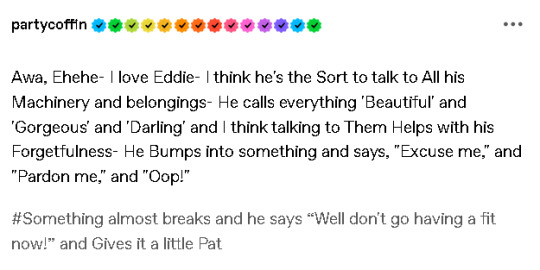
Eddie is also accident-prone, always getting himself into situations (a bug landing on his paper chains, getting chased by Barnaby) and is mainly depicted as the unwilling comedian. Many of his character aspects are depicted as a source of comedy, even by himself. Eddie also has tendencies of prioritizing what others want before himself because of his even-tempered nature. So far, Eddie doesn’t express any serious frustration over this, but with the themes of agency recurring in this story, I’m afraid that it’s going to be a matter of time before we see Eddie express discomfort over this.
Throwback to what I have said: Frank is a smart person who constantly searches for logical answers to things, while Eddie is more laid back and isn’t very focused on finding the right answer and just wanting problems to be handled. This contrast on their personalities and how their backstories are foils of each other (Frank coming from unclear origins, Eddie not knowing the name of the place he’s from) make me think: Is ignorance bliss to Eddie?
Julie Joyful
The sunshine of the neighborhood! The bringer of rainbows in Welcome Home! Julie stays true to her surname, always depicted with a bright smile on her face. She is the one that can turn Frank’s frown upside down. She is the one that can bring a tinge of comedy in Sally’s tragic dramas.
Julie joins the side of the neighborhood that has clear origins. She once lived inside a cave with her siblings, but ultimately leaves under her own volition to find life for herself. Regardless, she is a character that is known for her constant interactions with other neighbors, notably Frank, her best friend.
Her friendship with Frank is extremely special for both of them – if you want to read about it, you should go to Frank's section of this thinkpiece as I've covered most of my thoughts about Frank and Julie's friendship there, but I want to add a few more things.
She is the "funny man" to Frank's "straight man", forming the neighborhood’s comedic duo. She drags him into her shenanigans, like the time they played “Business Woman In The Big City”. They’re also quite competitive when participating in the games that Julie conducts. She brings out the best in Frank, always making sure he feels included and happy in any activity they do. Julie is the “spontaneity” to Frank’s “routinity”. Julie is the “fun” to Frank’s “frown”. They’re inseparable from one another, like Barnaby with Wally.

As stated by Clown, Julie is genderfluid and bisexual. She doesn’t have a love interest set for her, but what’s important is that her character is emphasized with her connections with others. When Frank couldn’t play with her, she plays with Sally and enjoys spending time with her and even stars as the main character in many of the latter’s plays. There are lots of love inside her, after all! She is also said to be quite touchy with her friends, often hugging them and encouraging them to go through with the things they want to do. It doesn’t always have to be seen as “romantic”, like I’ve said before.
Onto her status as a puppet for Playfellow Workshop. Something funny is that Julie has a tendency to go off-script as shown from her interaction with Sally while practicing for a play. She has issues getting into the mood of her plays, making scenes that are supposed to be emotional… comedical, instead.
Is this supposed to symbolize something further? Is this habit of hers pointing towards how she’s going to express her unwillingness to be a mere cog in the big machine? The puppets are very much sentient, but I am not sure if they are aware if their actions in the WHPS episodes are controlled by the script. Time will tell, and perhaps, Julie too.

Home
Finally, we get to the last but one of the most important characters in this story – Home.
Home is the ninth residence of the neighborhood, though it’s not a puppet but a stationery character. It houses Wally, the main character of this story. Unlike the rest of the cast, Home talks in onomatopeias, like creaking its doors or opening its windows to produce sound as means of communication. Its eyes are very expressive and is constantly moving. Unlike other houses in the neighborhood, they’re very expressive.
Their importance isn’t only limited to being Wally’s house or being the only character in Welcome Home that cannot walk or talk.
The mobile characters of Welcome Home never expressed annoyance for Home’s non-verbal trait and instead put in effort to understand them and include them in their activities. They accommodate for Home, making sure they feel comfortable, wanted, and not left out. Home feels… at home around them.
Wally writes for Home to help it communicate and makes his canvas face Home whenever he’s painting, Julie teaches it how to hula hoop, Eddie makes small talk with Home, Barnaby makes jokes and laughs with Home, Frank tries to include home in games of chess, and so on! Home isn’t just a building like the rest of the cast’s houses. They are part of the family. It makes me so happy to see that their existence isn’t considered a burden or an annoyance or have their traits be seen as sources of comedy. It hits close to home for me as a physically disabled person.

Regarding the overarching story outside of WHPS, Home is a character that plays a significant part in Wally's journey. Wally loves Home dearly. He takes care of Home and makes sure he is in great condition. He is the caretaker for Home and becomes its communicator when the situation calls for it. In return, Home makes sure Wally is safe and sound inside their cavity and expresses their love for Wally through communication from creaking noises and even lightly squishing him between their door and door frame. Home is also quick to notice changes in Wally’s behavior and shows their concern for him, signifying just how deep their relationship is.
As I’ve mentioned many times before, their closeness cannot be boxed into the usual types of love humans are used to. You just know they are extremely linked to one another and that their relationship is not only important in WHPS, but also the story as a whole.
Home and Wally are inseparable from one another. They have their separate personalities and are distinguishable from one another, but ultimately they will always be one. Home is Wally’s fortress. Home is the shield to Wally’s sword. Home is the pericardium to Wally’s heart. After all, “Home is where the heart is”, right?
Afterwords
Yay! Whew! Congrats on making it to the afterwords! I’ve spent more than a week writing this whole thing and having my friend @rxveriecaeli proofread this thinkpiece (Morfe if you’re reading this I love you bestie). Huge HUGE shoutout to them because I’d be lost without them giving the finishing touches!
I know, some people will say that I’m reaching or thinking too much about this story, but hey! That’s why it’s called a thinkpiece and not a theory or concrete proof of X or Y. I cannot say that I’m 100% sure about where the story is heading or what Clown has in mind for certain characters, but I just want to think and love making connections and my brain just keeps producing questions after questions after questions. Are the feelings they have with each other theirs and not the byproduct of the script commanding them? I believe so.
What if Poppy is a flightless bird because she's based on Big Bird and not because it's an analogy for her not being able to fly freely away? What if Howdy is an adult caterpillar because he just IS and not because it's an analogy for not being able to turn into a butterfly that can fly? These options might be so, but even if Clown someday confirm that their design choices are simply because they're inspired by other puppet characters, I'm just happy that I manage to find symbolism that I can connect to their character designs.
I think it's too early to assume that the puppets are surely seeking freedom. At most, they just want to be saved from the tragic states they’re in, and Wally is on the lead. I mean, the show's canceled and they no longer live by following the scripts made for them! We don't even know the true fates of them aside from being nearly forgotten to time. And even if the puppets do achieve freedom, what will be of them? The producers aren't around anymore, the employees that treat them as toys but also take care of them aren't there anymore, and they have to fend for themselves in the big world.
I am not a native English speaker and I cannot put some of my thoughts into words both because of my language barrier and my ADHD. I do not intend on expressing malicious or harmful subtext through this writing, but do tell me if I had worded anything incorrectly and I will fix it. I would love to hear your thoughts about this thinkpiece too, so don’t hesitate to leave comments or tags in the reblogs (though please be patient with me!). Not that I will tolerate hateful or bigoted comments, however!
Please do not start accusing me of spreading the rhetoric that “being queer/neurodivergent is painful and constantly suffering and if you don’t suffer you are not part of those groups”! Being queer is fun and liberating. Being neurodivergent or disabled is something to take pride in. I’m proud of who I am and I encourage others to be so too. The experiences of queer/neurodivergent won’t always be easy, though, and I made this analysis and the correlating connections based on my own experience as a queer, autistic, and physically disabled person.
That being said, thank you for reading!
Fun little trivia! The characters' favorite colors form a rainbow when put in respective order, just like the colors of the original pride flag :]

#LONG POST AHEAD!!!#welcome home#welcome home puppet show#wally darling#sally starlet#frank frankly#poppy partridge#howdy pillar#barnaby b beagle#eddie dear#julie joyful#home#senja writing
228 notes
·
View notes
Note
*Jiggles mental Piggy Bank for question/comment to hear more thoughts on Cinder - Winter parallels and contrasts*
Another point for Winter not reacting as Cinder would expect to the Rhodes/Glass Unicorn. Winter tells Jacque to not thank her, as it was Weiss's idea to not leave him behind as I recall.
Though Winter <-> Cinder is fun in general to think about because between Penny's death and Weiss's presumed at time and that musical sting which has been named the "Such Arrogance" motif by the community because the buildup is there for an additional round.
But admittedly I just find the Maidens as a character grouping just intriguing in how they're used. Supporting characters with their own arcs that are fairly decent supporting pillars for the themes of the story that with the final faces (Cinder, Winter and Raven) known to the audience for a majority of the runtime of the show. They aren't new characters (until Summer) the audience is asked to care about. Might be a word for this but I don't know it if so.
yeah it’s . always been a little (quirks eyebrow) to me that winter goes out of her way to inform jacques that if not for weiss she would have stone cold left him to die when atlas fell. taken on its own it’s an interesting character moment for winter – prior she makes a fairly convincing show of just taking pains to avoid him and having an emotional outburst when she’s forced to sit in his presence, but the truth is that she actively wishes him dead, and by implication she not only deferred to her younger sister’s judgment but has also been keeping that desire to herself for weiss’ sake. i get the impression – admittedly just on vibes – that it’s weiss who raised the issue of “what do we do with father? he’ll die if we leave him here” and winter simply kept her mouth shut about feeling that would be okay.
taken as a piece in the foil structure between winter and cinder, i think it rhymes with what rhodes asks cinder to do – turn the other cheek to protect the madame and her "sisters" from herself, versus winter deciding of her own volition once she is out of the abusive home that her desire for jacques to die is something she will privately acknowledge but keep to herself, because her sister doesn’t want that. the situations are quite different in that winter isn’t coerced into making this choice and isn’t materially harmed by doing so – whereas cinder is compelled to become a willing participant in her own abuse – BUT,
it is also of a piece with winter’s self-sacrificing inclination (“my life doesn’t matter,” and such) and her complete lack of self-worth. of course she can’t and shouldn’t and wouldn’t just murder jacques in cold blood – in self-defense or defense of another family member, certainly i don’t think winter would hesitate to cut him down if she felt it necessary, but to act on her desire for him to die by going out of her way to kill him? she would never.
however, by restraining herself to such a degree that no one really knows how deep the wounds and how intensely just being in his presence enrages her, she a) denies herself the opportunity to release these feelings and begin to heal, and b) puts herself in a position [per arrowfell] of being the atlas military’s point of contact with the SDC, which she could probably remove herself from by confiding in ironwood about the extent of her distress.
and i don’t think there is any real reason for winter not to be more direct about how she feels with weiss; it harms weiss not at all to hear that winter is so angry at their father that she struggles to be civil around him, for example, and in earlier volumes it might well have helped weiss to receive an overt reassurance that what jacques is doing to her is unacceptable vs the oblique encouragement winter gave her.
so to an extent – winter makes the right choices (keeping her temper in check, avoiding jacques, being mindful of her sister’s feelings) but takes it to a detrimental extreme because the combination of jacques’ abuse and atlesian military conditioning resulted in her sense that her feelings do not matter to anyone but herself and must be hidden if not outright suppressed.
and there is the additional factor that a) rhodes promised cinder admission into atlas academy as her escape route, and b) winter enrolled in atlas academy and later joined the military to escape her abusive home, and how did that turn out for her? well…




…funny how that works.
in potential, at least, winter is in a ?WEIRD? spot in relation to cinder of not just being able to understand where cinder is coming from and why she did what she did, but also sort of literally embodying the counterfactual – if cinder continued to turn the other cheek for a few more years and then enrolled in atlas as rhodes planned, what would have happened? would it have saved her? who would she be? is the cinder fall who followed that path to the bitter end a good person? is she free? is she safe? – winter is the one person in this story who can answer that honestly, because she is that cinder fall.
and the answer is no! the answer is that atlas academy would have continued the work of systematically stripping away cinder’s humanity until she either became an obedient cog in the machine or or stepped out of line and faced violent retaliation. winter was ironwood’s second in command and that did not protect her from being thrown under the bus when she followed her conscience with regard to YORJ, nor from ironwood doing to her the exact same thing rhodes did to cinder when she disobeyed him.
so if winter, through whatever series of events might lead to it, learned about cinder’s past – yes she understands the impulse to free oneself from an abuser by killing them, and certainly she will empathize with cinder’s actions given the circumstances (frankly i think winter would empathize even with premeditated murder, but what did happen is such a clear-cut act of self-defense that i don’t think winter would even blink). but that’s true to some extent for most of the heroic cast – no one has any concerns whatsoever about blake and yang killing adam, as a point of comparison.
but what makes winter’s perspective unique is that a) she can also understand, and empathize with, the "quietly endure abuse until you’re old enough to apply to atlas without your guardian’s permission" dimension of cinder’s trauma, and b) she lived the "what if?" scenario and still, in the end, faced violent retaliation from her trusted mentor just as cinder did, and her outrage at his injustices is no less potent than cinder’s.
as it is now, winter knows that cinder sees herself as someone who has been deprived and is fighting back – “you atlas elites are all the same! you think that having power means you’ll have it forever, but it just makes the rest of us hungrier! …and i refuse to starve.” one presumes that she also heard the speech cinder broadcast over the CCTS – “huntsmen and huntresses should conduct themselves with honor and mercy, yet i have witnessed neither.” and “the leaders of our kingdoms conduct their business with iron gloves.” cinder orchestrated this horrifying spectacle, but the problems she speaks to are very real.
and then, “i think father may have provided the spark that’s going to set this kingdom on fire” and “you can’t just buy trust like everything else; you have to earn it!” and “no, you have sacrificed everyone else! – you closed the borders – you squeezed mantle until it broke–” and winter would have left jacques to die if not for weiss, and did leave ironwood to die.
cinder isn’t – i keep saying this – cinder won’t be receptive to any kind of moral appeal or appeal to mercy from the heroes, because all she will hear is rhodes. oh, they’ll give her a chance if she behaves? been there done that, she knows this song. winter specifically has the potential to surprise her with: “no, you were right. you’re right. and if you’d made it to atlas academy, you would have either been crushed or warped into the very thing you hate most.”
and that’s really interesting to me – with or without a possible romantic eventuation – because… what then? winter isn’t about to join salem, but i think she would be equally averse to trying to persuade cinder to leave salem once she understood cinder’s reasons. and she’s also an introspective character deeply concerned with the morality of her choices yet also pragmatic yet also the one who, even at the last possible moment, cracks open the door one last time for ironwood to change his mind. the sort of advice she offers weiss in v3 is exactly what cinder needs to hear; and if she can find it in herself to feel sympathy to cinder fall of all people then surely she can also forgive herself, or at least inch in that direction.
where does that leave them? cinder walks away with a lot to think about – atlas is gone, so what does she want now? – and winter has in one sense a new crisis of conscience to deal with (how could she choose to let salem’s most dangerous lieutenant go?) that is also an emotional challenge to herself (she chose it because it felt like the right thing to do, and if it’s right to afford mercy to someone like cinder, why is she merciless to herself?). and in the midst of that sits the dilemma of cinder’s righteous anger – it is a moral imperative to protect the innocent, but if the enemy is a victim of the system you are fighting to uphold in the name of the innocent, that complicates things.
winter kept her head down for most of v8 because she made the determination that she could do the most good – mitigate the most harm – by remaining at ironwood’s side. and that paid off:
she was able to put YRJ in a position to rescue oscar.
she insured all of them evaded ironwood’s custody by refusing to search for them after the whale blew up.
indirectly, this means that winter is the reason penny wasn’t overwhelmed by the virus, because jaune made it to the manor, and she played an indirect role in emerald joining the heroes instead of just bouncing
she gave cover to marrow’s questioning when his other colleagues would have thrown him under the bus for it.
and she was ready and able to save his life and get both of them out safely when he broke with ironwood.
had winter left with her sister, or at the top of v8, harriet seems to be the next highest-ranking special operative and she is the one who would have been making the judgment calls each time winter had an opportunity to act. the cumulative effect of winter’s choices, most of them small decisions within the margins for interpretation and best judgment while following orders, is to carve out a really significant advantage for the heroes by the time ironwood crosses the red line.
so winter is precisely the kind of character i would expect to, upon being confronted with something like cinder’s history, be very practical about what is the best way to reduce or stop the harm? if cinder fall is on this path because she intends to destroy a horrifically unjust system that wronged her in grievous, irreparable ways, is treating her like an evil monster effective? will it do more good to acknowledge that her anger is justified and show her that we’re willing to work with her – which crucially isn’t the same as asking her to join us because our decision to address these problems cannot be contingent on her leaving salem? is there a way to de-escalate without endangering ourselves and the people were fighting for? what can we do to lower the temperature?
it folds into the momentum toward ceasefire with salem very tidily. cinder is in many ways an easier nut to crack, if only because she’s already told winter (in abstract terms) what she wants and why and winter is demonstrably a character capable of connecting these dots, once she surmounts the immediate obstacle of her oath of vengeance. which is less difficult than it might seem on its face, because winter blames herself with equal intensity and is generally – as we’ve seen – very willing to wrestle with and re-examine her feelings as circumstances change.
#romantic or not i do expect winter to play some role in cinder’s turnaround#bc like. why else parallel ironwood to rhodes in relation to winter??
32 notes
·
View notes
Note
In your opinion does "The Owl House" have any re-watch value? Does the story, characters, characterization, writing, etc. hold up over repeated viewings or is the show played out after the first time through the series?
So I want to acknowledge that this is actually an awkward question. Not with how you phrased it or anything just... Period? Because whether something is rewatchable will mostly come down to personal taste and enjoyment. Some people find Horror movies to be great fun to rewatch while others may not see the point because you already know all the scare moments or answers to creeping dread. Some might find action movies exciting to rewatch while others need the novelty of a first rewatch. As such, my answer is very much so is going to be biased by the fact that I ended up not liking the show.
But... I broke essentially on rewatch in a way. A lot of people have shattered on TOH essentially from having to reconcile what it says versus what it does. A lot of this because TOH constantly kicks payoffs down the line and hints at potential it will reach. It is constantly making the journey suffer for the promise of a grand finale. And, well... A lot of people have agreed that the shortening did not force their hand to break multiple themes in the finale, or take Amity's character or a bunch of other things that bloated the series and never got a proper payoff, such as the Collector.
This format of TOH I think is actually what makes it so hard to rewatch unless you are the ultimate fan of it who will notice nothing. S1 is labeled as boring, a complaint I even agree with as someone who mostly likes S1 still. It spends the most time setting up plot lines though in episodes that are a pretty safe seven out of ten, or worse. Amity episodes can escape this problem decently often, being fun in their own right, but that's why the fandom only acts like half, at best, of S1 even exists. Most of it is easily forgotten because it's very forgettable. Not like in a S1 of Amphibia way where it's all so much fun but also so much of it that they can blur and be hard to separate but just in a "I just wasted 20 minutes of my life watching an okay kids cartoon" way. The only thing that helped those episodes not feel that way was this idea that it was building towards something with these characters.
And... After the shock of things like the Lumity Kiss being real, I don't think S2 holds up for being the majority of those payoffs. Amity and Willow? One of the most explicitly kicked cans? Seen interacting on the same side before either addresses the "We're not friends' thing because of Eclipse Lake, so that's pre-shortening and they still didn't decide to address and then address it badly. Luz's magic is wrapped in a plotline she's not a part of and has no real reaction to even. It's just "Oh, we're just making bullshit up now instead of finding glyphs? K." Amity's parents are wrapped up, in the same episode, early S2, in a very similar way where Amity is barely a part of that episode but now her core angst and excuse for being a bad person? Dealt with and out of the way, at least until they randomly decide to try and say Alador TOOOOOTALLY wasn't a bad guy. That he hated Odalia too. Totally doesn't contradict literally everything that came before, something that would be much more sharply noticed on a binge rewatch. Like... It cannot be understated that by the point most plot threads in TOH wrap up, they were introduced and left to rot for so long that half the time, the fandom was starting to get UPSET during the runtime for the lack of any exploration or conclusion. Long hiatuses didn't help but at its core, even when it was running people were wondering when we would get satisfying answers to thing and rarely were they happy about it.
I think this is a core part of why ONLY the shipping community seems to have clung to TOH. That or people who are exploring the show's missed potential with characters like Belos or the Blights. The fandom has had to either commit to the one thing TOH did do well, its shipping (that comes with so many fucking asterisks) and its potential baiting. But the latter also means you have to recognize why it failed in the process of doing your exploration of the work.
So will some people enjoy rewatching it? Of course. There are people who probably like rewatching the AtLA movie though because the die hards are die hards. Do I think from a casual perspective you get much out of rewatching a random episode, let alone binging the series again?
No. I just think disappointment that the main series will leave you, which will eventually no longer be tempered by the reputation of it having been shortened, will only get worse. It is not a tale worth seeing again, so I hope I see you in the next one.
======+++++======
I have a public Discord for any and all who want to join!
I also have an Amazon page for all of my original works in various forms of character focused romances from cute, teenage romance to erotica series of my past. I have an Ao3 for my fanfiction projects as well if that catches your fancy instead. If you want to hang out with me, I stream from time to time and love to chat with chat.
A Twitter you can follow too
And a Kofi if you like what I do and want to help out with the fact that disability doesn’t pay much.
22 notes
·
View notes
Text
Galavant is the best show of all time. It's amazing how a show that really doesn't take itself seriously, that's comedic and self-aware for the vast majority of its runtime, still manages to throw you with a curveball and hit you some genuinly sweet and melancholic songs every once in a while. It makes fun of itself a lot, but it's never self-deprecating. It doesn't treat its characters like nothing but jokes to be used and thrown away. By the end, you remember the jokes, but you also have a real fondness for the jokers, and I just find this great
youtube
9 notes
·
View notes
Text
Yesterday I’ve watched the PotO cartoon from 1987.
It is bad, but really fun, made me laugh many times. The animation is atrocious, but I don’t think that they had a big budget, so I don’t really mind. Btw this cartoon does more justice to the novel than the majority of its adaptations.
It is really close to the original novel: it has some minor changes (like Raoul and Christine hanging out before her singing debut and Erik’s death) and some cuts (which makes sense considering it’s short runtime). I absolutely loved how there were some lines that were directly taken from the novel! Really great!!!
Raoul is just like his book counterpart, being jealous, a bit of a bitch ass and willing do to anything for Christine.
WE HAVE THE DAROGA (which is a plus, I love you Daroga). He isn’t comedy relief (thank goodness) and actually knows what he’s doing.
Also Christine is close to her original, maybe a bit violent? She literally throws a bottle of perfume to Raoul, because he was overhearing her conversation with Erik (really unexpected)
Erik here is the same as Lerik, pathetic wet cat of a man, crazy af, has the humor. He gets his redemption a bit differently… He decided to leave Christine be with Raoul after realising how strong their love is and then he gets kissed… Not particularly fond of this decision, undermines Christine’s action imo. HE RANDOMLY KILLS A CAT!???! I HATE THAT! I think that he wouldn’t do that, try and change my mind. The shot of his yellow eyes is really cool, love that.
I’ll probably do a lil doodle of cartoon Erik

Look at this smug bastard.
21 notes
·
View notes
Text
Kaiju Week in Review (September 3-9, 2023)
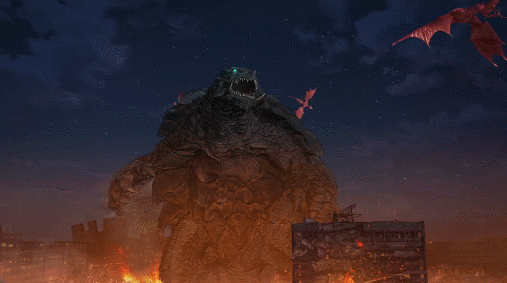
I was a bit nervous about GAMERA -Rebirth-; the animation looked dodgy and Netflix has a shaky track record with kaiju shows. I'm pleased to report this is the best entry in the genre that they've put their name on. Good characters, great action (brutal as always), and actual episodic storytelling that effortlessly weaves in elements from the Showa films beyond all the returning kaiju. Watch it immediately.
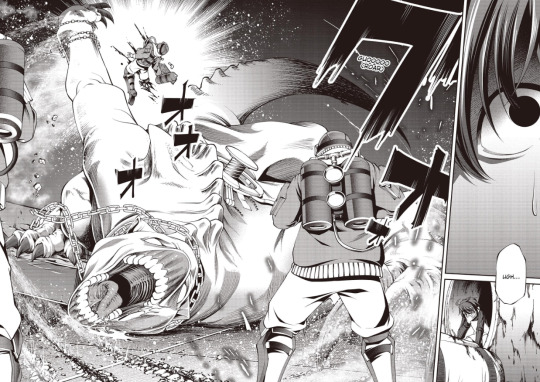
Tie-ins abound for GAMERA -Rebirth-: a two-part novelization, a manga adaptation, and a prequel manga that sheds some light on [UNBELIEVABLY MASSIVE SPOILERS]. That prequel manga (GAMERA -Rebirth- code thyrsos) is being published online for free in both Japanese and English. You can read the first chapter here.
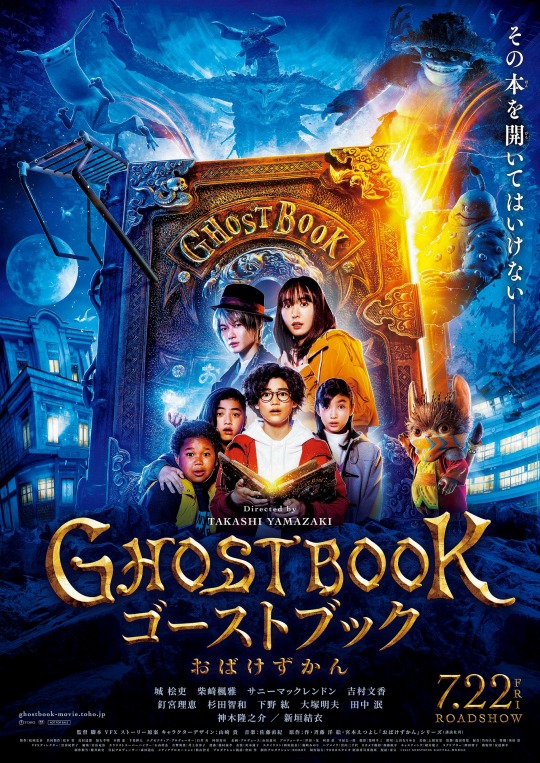
In unofficial translation news, English subtitles for GAMERA.1999 (1999) and yokaipedia (2022) are now available. The former is Hideaki Anno's making-of documentary for Gamera 3: Revenge of Iris; the latter is a fun, child-friendly fantasy from Godzilla Minus One director Takashi Yamazaki with a big ol' centipede-dragon at the end. (It's also maybe the first Japanese kaiju film I've ever seen with a major Black character.) I haven't gotten to GAMERA.1999 yet, though from scrubbing through it, it seems like a lot of dialogue was just ignored by the translator. Shame, as that's one I've wanted for a long time.
youtube
We have a teaser for Monarch: Legacy of Monsters, as well as a premiere date for the first two (out of ten) episodes: November 17. (I am being showered with Media for my 30th birthday.) The big news from this trailer is that John Goodman is reprising his role as Bill Randa from Kong: Skull Island. I assume that's going to be through flashbacks and old recordings only, since he was eaten by a Skullcrawler in that one. We also catch glimpses of two new creatures, a dragon and a crab from what I can tell. The latter looks to be fighting a Mother Longlegs.
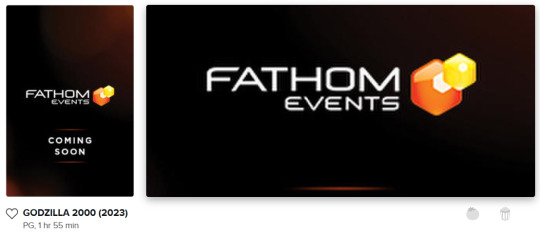
Fandango and AMC have added mostly-empty listings for Godzilla 2000 on November 1. Fathom Events screened Godzilla Against Mechagodzilla on November 3 last year; despite randomly showing Tokyo SOS back in March, I gather they're making a tradition out of Godzilla Day. Note that the listed runtime is longer than the film itself. Predictions for the program: another message from Keiji Ota, the 2022 Godzilla vs. Gigan short, and the Japanese version of G2K. Interesting that they're running the last Toho Godzilla film to receive a wide release in the U.S. exactly a month before Godzilla Minus One has a wide release of its own here.
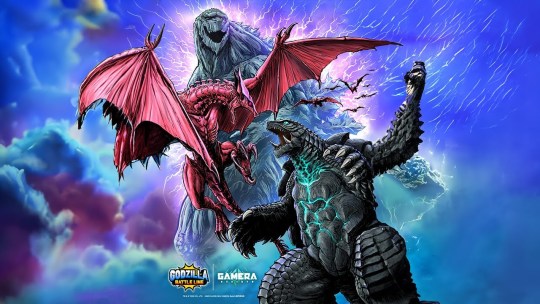
Gamera isn't a meta-defining Godzilla Battle Line unit... but he's Gamera in a Godzilla game, so I've been using him in every match since I unlocked him. He's gearing towards demolishing flying units, with fireballs that deal more damage against them and knock them back. A pity that he's arriving well after those units were at their most dominant.
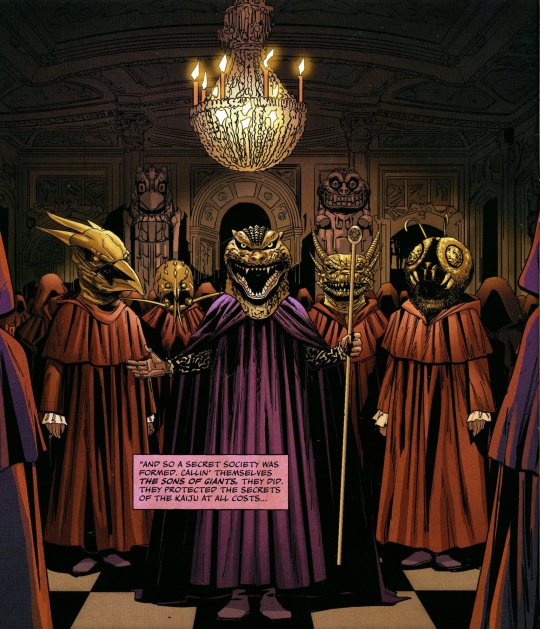
Godzilla: Here There Be Dragons #3 still isn't giving me much to write home about, but the kaiju cult creeping to the forefront intrigues. Also cool to see Ebirah in a starring role.
youtube
Marubeni, one of Japan's biggest general trading companies, put out a bizarre commercial featuring samurai, zombies, a meteor, and a refurbished GMK King Ghidorah. The ad now has English subtitles, and you can watch a Ghidorah-centric behind-the-scenes video here.
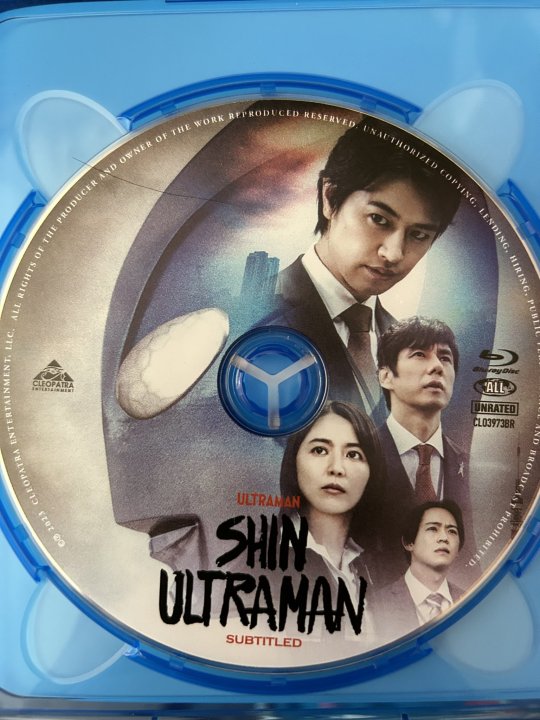
I cannot believe I have more Cleopatra Entertainment fuckery to report on with regards to their Shin Ultraman releases, but they're truly trying to take the "Worst Film Company of 2023" title from the members of the AMPTP. Their third attempt at a barebones disc is starting to reach customers... but the ones who already received the initial replacement disc are being told no more will be sent. @starestream is trying to figure out if they'll be selling the third edition on their site, since it seems buying it anywhere else is a gamble. (Physically, the third edition looks almost the same as the first two, set apart only by the "SUBTITLED" text on the disc.) Either way, it's another blow to a movie that truly doesn't deserve this.
91 notes
·
View notes
Note
aaa hope you dont mind the ask, but like,, youre a clownpierce fan too right? lol
i heard about winterpine and im curious about it, you mentioned watching some of it (mightve been scrolling through some of your posts)
is it interesting? i was debating checking it out because im curious, and clownpierce is in it, but i dont know what its like or what channel its on. also should i block the tag to avoid spoilers if i start watching it do you think?
Well, I am a ClownPierce fan and I have watched Whitepine so this is as good a place to ask as any! And don't-cha worry, I like answerin' asks all the time! :D
I'm not sure what the Whitepine tag contains right now but it might have certain out-of-context spoilers, like most general fandom tags do, so if that bothers you it might be a good idea to block it — personally I wouldn't, mostly bc the series isn't that long as of right now anyway: it currently has 3 episodes of around half an hour each, more or less (31 minutes & 19 seconds, 32 minutes & 47 seconds and 25 minutes & 34 seconds specifically) and the story is barely starting; there's things to be spoiled about, sure, but nothing too major either. I wouldn't worry about it.
In terms of how interesting it is, however, it depends — personally I thought it'd be better, but it's also because I discovered it through someone who was singing the series some serious praises like it was the second coming of Jesus Christ in Minecraft series form; not the favor he thought he was doing to the series, honestly. The series is a murder mystery period drama with Ivory as its protagonist — Clown does appear but he's not constantly there, so if you wanna watch it expecting Clown to be there all the time, it's probably not for you then. The series also has a lot of lingering shots and silent scenes where not a lot seems to be happening, and it might make the episodes feel longer or a little boring, but it has good cinematography going on, and the character interactions are fun regardless, so there's always that to look forwards to. Ivory is a charismatic, soft-spoken protagonist and is partly what made me stay through the rest of the runtime for the series — it's a decent show all things considered, but because it's barely just starting (the first episode was posted just two months ago, so.) it doesn't have too much meat to its bones yet; if anything, I'm sticking around for Ivory's character, Serapter's, Pyroscythe's and Clown's, plus the intrigue of how IvoryTV (the main storywriter behind Whitepine) is gonna unravel the mystery, not necessarily due to the currently laid out story.
The channel it's being posted to is IvoryTV, though looking up Whitepine on youtube should be enough to find all three episodes — hope this was the answer you sought for! 😊😊
#personally whitepine is just okay#not bc of anything they've done or havent — the series is just too new to have any interesting or cool twists laid out on the bare like that#so all in all the series is okay — not too interesting but like. it's BARELY starting. it's obviously here to be a long-term thing#also it's like. UNGODLY pretty#visually and ost speaking it's just. PRETTY. full stop#all the colors are muted in a way that reminds you of that middle point between fall and winter#the music is all apparently composed by IvoryTV herself as well which??? WOW. ungodly talented she is omg#anyway#demon rambles™#whitepine#ask box#ask#ask answered#I'm never bothered by getting asks btw!#it's entertaining to answer them :DD#so long people are respectful and shit about their questions then we good 👍
9 notes
·
View notes
Text
La Chimera, 2023, dir. Alice Rohrwacher

Cast: Josh O’Connor, Carol Duarte, Isabella Rossellini. WC: 972
La Chimera (2023) is an Etruscan adventure of archeology shown in a daydreamy and surrealist tone that makes the audience question what lies underneath its strange soil. The film is rooted in Josh O’Connor’s lavish and serene performance as Arthur, a scrappy Englishman with a gift for archeology. His presence at first is cold and aloof, understandable for someone who just got out of jail. Arthur is a dirty-scrappy-rat guy, to say the least. His beige suit is worn throughout the entire runtime, making you wonder if he’s grieving someone and is stuck in a depressive episode. This turns out to be true. At the film's beginning, we’re introduced to Beniamina, Arthur’s dead fiancée, who haunts the narrative in her white, virginal dress, like a typical Ophelia. Nonetheless, Arthur has emotional layers slowly peeled back to reveal more mystery as the plot becomes more erratic.
After Arthur is released from jail, he seeks out an Italian village where his dead fiancée’s grandmother lives and where his grave-digging buddies are ecstatic to see him. Arthur’s quirky crew of archaeologists is a wondrous ensemble that provides comedic relief to the quieter or slower parts of the film. They are enriched in grave digging, they have fun, like some buds doing their favorite illegal pastime. Soon after they reunite, Arthur and the crew find an Etruscan temple to a mystical goddess hidden near the rocky shores of an industrial complex. The scene in which they encounter the temple is almost thrilling, with the absence of score and the presence of digging creating discomfort about what lies below. But what is found is a perfectly preserved temple with a statue displayed of the tributed goddess. This was the jackpot for the crew as they decided to cut off the head of the statue and see what they could sell later. As an audience member, one could be a bit agitated that these grave robbers just destroyed a beautiful piece of ancient art. La Chimera essentially executes the Indiana Jones-type mindset where “this belongs in a museum” becomes “this belongs in my hands,” a mentality that Arthur initially adapts into his way of living.
The story of La Chimera is somewhat distorted when the audience is put in Arthur’s perspective. His character is turbulent in morality, especially around the preservation of art, a theme shared with a major theme of the film. Does it belong in a museum? He has this internal debate about whether his bad actions make him a bad person. But of course, the film isn't all about him, there is the character of Italia; somewhat an aspirational and quirky love interest to Arthur, she is in her own world but grounded in the morals of this one. Italia shows Arthur that his life isn’t in the dirt and that he needs to put his energy into better (legal) things. But Arthur never really listens to her, instead seeking a divining rod to find a tomb to dig up.
Arthur is one with the ground, reflected in the cinematography which inverts and reflects at certain angles while he’s grave digging. Rather odd choices in camera angles dissociate the viewer to think that what Arthur must be doing is downright wicked. In these scenes we see his desperation to find his lost love, constantly looking to the soil for answers. Not to mention the reoccurring dream sequence in the film where Arthur dreams of a red string leading him back to his loving Beniamina, who he is connected by fate symbolized by the string.
Director Alice Rohrwacher asserts her vision of La Chimera through cinematography. Certain scenes show a variety of color palettes to deepen and reflect the emotions and tones of what the characters in the scene may be feeling. When alone with Arthur, it is cold and musty like an isolated, shivering white man rotting away in a coffin. When we are with his friends, however, it is a proper colorful, and citrusy Italian summer; vivid warm tones and deep blues reflect the Mediterranean's inherent beauty. La Chimera can have an amazing range of colors, but also somewhat dragging moments in lonesome scenes with Arthur. As done intentionally to develop grief in his character by forcing the audience to spend so much time with him, you see how lonely and melancholy he is.
La Chimera is textured with diverse filming mediums, alternating between 35mm and 16mm film, along with dabbling in different aspect ratios as well. One scene, in particular, is shot normally mounted and static until it cuts to a goofy scene where Arthur or some other characters are sped up like in a Charlie Chaplin film. This inconsistency helps drive the surrealist aspects of the film, constantly making you doubt what is to be taken as reality or an elaborate hallucination. That strife is possibly the best takeaway from La Chimera, not knowing whether Arthur is experiencing certain moments of the film is thrilling in a way. The mystery of Arthur's sanity and credibility as a narrator keeps your attention as he slowly obsesses over what lies underneath the Etruscan soil.
La Chimera is a truly unique film in this day and age of cinema. It tackles mystery, drama, thrills, and comedy all in an inspired and creative way that can only be understood if you watch it yourself. Undoubtedly, the film proposes questions about archeology, morality, and what lies in the afterlife. In Arthur’s case, his love and passion all lie in the soil of a foreign land, where he is engulfed in his obsession with what is unseen to others. La Chimera can present as a fun archeologist adventure film set in Italy, but La Chimera is a transportive experience of life and death and what lives on hidden in the earth away from the greedy eyes of others.
🎞️✮⋆˙


FINAL RATING:
⭐⭐⭐⭐☆
#movie review#letterboxd#cinemetography#cinephile#italian#josh o'connor#la chimera#art history#film blog#drama#romance#mystery#horror
4 notes
·
View notes
Text
Magic as a TV Show
(CWs: Child Abuse, Cults) (Edit: Did some light editing, still a bit messy but should be fine now)
So, it's not a secret that I'm a big fan of Magic. It's my favorite T1 MV and one of my favorite Milgram MVs in general. Even before Purge March I'd re-watch it over and over again just because I liked it so much.
One of my favorite things about it is the way the visual language and symbolism develops over it's runtime, and with Purge March it's gotten ever better so lets talk about it!
Based on True Events
So, Magic is the very cheery TV Show that is based on the horrors going on backstage, and it's also aware of it's own fictional nature. It ends with the real Amane watching the show. It knows it's a world created by a 12 year old who wants to be Good.
This causes something interesting when viewing it's imagery. As Magic depiction of events can be both very literal and very metaphorical at the same time.
For example: Something that surprised most people (including myself) is the cat being real, and while it is representative of Something (which we will get to) it is very much an actual cat that was killed.
Magic plays with what is real and what is fictional very loosely, and while certain things Happen in the real world, you can't really separate the real from the fictional here. It's too interconnected with each other and the imagery would lose it's impact if you did separate them.
So with that established it's visual analysis time!
The Set

So Magic is set in one place for the majority of it's runtime. This set! Which resembles a lot of educational kid's tv programs, usually ones for preschool and under.
Here's are sets from an early season of Hi-5 and Imagination Movers to compare.

You can see the similarities, it's heavy on bright colors and wacky designs, the logo of the show is plastered Somewhere you can easily see, and only some of the props can actually be used!
These two examples are also very music based. Both of them being shows starring children's musical groups.

The animals here (except for the Cat which is in a Complicated situation) are probably representative of the audience. The other people of the cult being taught along with Amane.
Audience Participation is a big thing for shows like this, you'll see them perform with a bunch of children on the side cheering and dancing. It's a fun time for everyone!
Going back to the set, while the main set only has the colorful stage we do see a few props in Magic. You can see a Choir book right here so the group can sing.

A Whiteboard to teach.

A Donation box to show your generosity.
And...

A Game Show Stage to see if you understood the lesson.
Age Rating
I've talked...extensively before on how Pain is handled in Magic and while that post is outdated because I posted it right before Purge March a lot of it still stands to some extent.
Amane's pain in Magic is downplayed in Magic, it's nothing serious. Even though this pain is something Inflicted Onto Amane Physically by Gatacha.
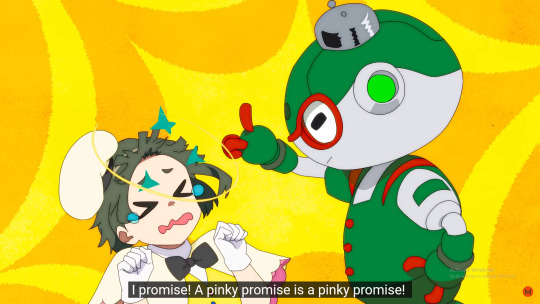
I was going to talk a bit about corporeal punishment in Japan before realizing that this isn't even something that is considered a punishment. It's just a finger flick. This is something your older brother does to you cause he thinks its funny. It's the lightest possible kind of "punishment" there is.
This makes Amane's reaction to it seem silly. An Overreaction to something that isn't even that bad. She has cartoonish swirls and falls over dramatically. It's...Immature of her to react like this.

Even though we know these are injuries are much more serious than they are shown here. Magic doesn't portray them as serious, and also portrays Amane as Immature for acting like this.
Which points to something interesting, as I said this show resembles a preschool show and it's strange that twelve year old Amane Momose, almost a teenager Amane Momose, is existing in a world like this.
It gets even weirder when we consider that, while Amane most likely hasn't been exposed to much media her mind still conjures up a marching band in Purge March and she talks very "adult" in both her VDs and hates it when people treat her like a child.
Not only that, but Amane Momose in both Purge March And Magic is drawn visibly older than she actually is.

It's not the easiest to see because I can't find a good picture but you can see it in just the face shape. Outside of Magic and Purge March Amane's face is more squishy, with less defined cheeks and bigger, rounder eyes. While Magic and Purge March have her face be more defined and her eyes smaller and sharper. Making her look more like a young teenager rather than the seven year old. She's even called Big Sister Amane in Magic's credits.
If Amane Momose's mind is depicting her as older than she actually is, and Amane Momose outside of it acts very "adult" and hates it when people treat her like a child. Why then does Magic portray her actions as immature? Why is she put in the spot of a preschooler learning from their teachers?
Why is Amane Momose, in her mind, stuck in a preschool show?
Well, there's two layers to this.
First of all, Good preschool shows are usually very empathetic to the kids watching them and good preschool shows don't patronize or talk down to the viewers.
Even if the problem is seemingly irrational or nonsensical.
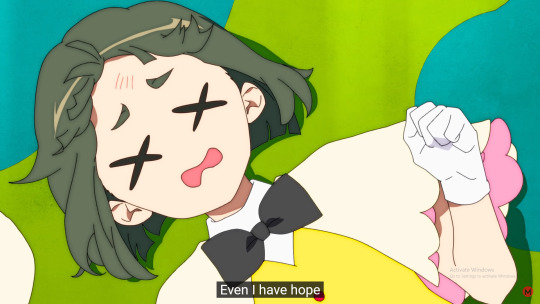
It's important to be empathetic with your viewers.
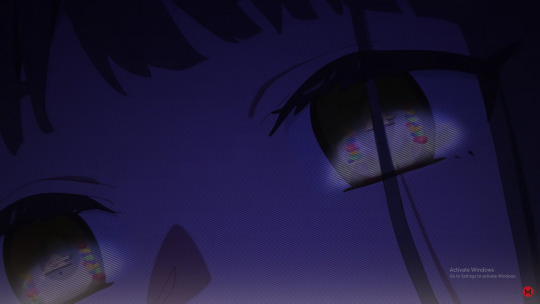
And to treat it their problems and issues with respect and understanding.
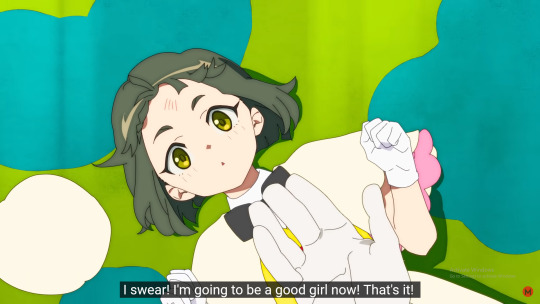
A concept that would be very appealing to Amane Momose, person who gets tortured for even showing a smidge of "impurity."
Second, why...wouldn't Amane Momose be portrayed as the preschooler learning here? She's the one constantly messing up, still not a good girl even though she should have learned by now. She's immature by the standards of her cult.
She's the perfect actor for this role, a girl that cannot be a good girl but wants to be.
Only if, only if, only if I could be a good girl I hope, I hope everyone can be happy and smile Forever, forever together would be a dream
The big sister that everyone can learn from, a character who has to learn from the older more experienced folk in the cast before becoming like them. The one who fails so that everyone else can learn.
This is the role Amane Momose has given herself.
Well...that and one other thing.
Cast

Will I ever get over the cat parallels?
The answer is no, but ignoring that, Amane has gotten two acting roles! The cat here is both the actual Purge March cat but is representative of Amane. As seen by how the injuries on the cat are her injuries in Magic and Purge March and how the cat gets directly paralleled with her in shots. This cat is, for all intents and purposes, both The Cat and Amane.
This gives the scene where Amane helps the cat a neat double meaning. Amane is helping the cat but it's also symbolically her helping herself...and failing.
Because Your not supposed to escape your trial.
Amane: Both pain and illness are trials.
This is one of the worst things you can do.
Amane: According to our teachings, those who run from them are the worst evil there is. That’s one of the four great principles. No matter who you are, that cannot be forgiven.
Your especially not supposed to steal those trials away.
Amane: Oh – speaking of which, there is one among the prisoners right now. An evil existence that’s trying to steal people’s trials away from them.
The cat is Amane's sinful desires to escape pain and help people, because that's Bad Apparently. She is cast as both the sinner and the thing that tempts people to sin. The corruptive force and the one who falls for it.
If were talking TV: She's the one in those 90s PSA episodes who gets Wrapped up in a Bad Thing and also the person who's the gateway to the Bad Thing.
(Blueepink has a wonderful addition to one of my posts over here which elaborates on this and is what made me realize it in the first place. Go read it she talks about some fun animal symbolism in it!)
Amane does however redeem herself in the end. You can always learn to be better after all. Even if you are the Worst Girl.

But you can't get rid of the devil that easily, she had some help!
(You can't get rid of the devil that easily in general, but it's nice to imagine you could-)
Let's talk about the mascots!
And Crew
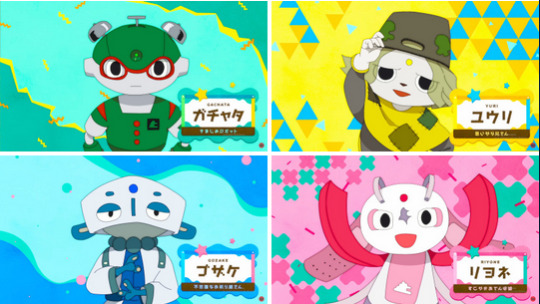
So as people have noted each mascot corresponds to one of the doctrines.
In Magic introduction order we have:
Gachata- ’Tis ordained, thou shall stay thine course, then perish Yuri- ’Tis ordained, thou shall deliver unto those thou believest in Gozake -’Tis ordained, thou shall discard vulgarity Riyone- ’Tis ordained, thou shall follow thine destiny
(Fun fact: The doctrines are introduced opposite to how the mascots are introduced in Purge March. I don't know what this means but it certainly is interesting)
Like a lot of children's tv show groups, each mascot seems to be focused on a specific task/idea.
Gachata is Teaching Yuri is Donations Gozake is Choir And Riyone is Complicated
Each design reflects this in one way or another. Gachata is a robot because robots are associated with being smart and logical. Yuri's clothes are patched up and he's wearing a bin making him look, well poor. Gozake is in priest's wear and has a Conductor's Baton and Riyone...
Well, she has bandage ears. But that's a weird design choice isn't it? Especially since the cult is so against medicine, or more accurately against escaping pain, that Wrapping a Handkerchief around a cat's leg is considered wrong.
Amane literally wants to kill Shidou Right Now for violating that rule...so why does Riyone have bandages?
The answer is she doesn't, this is Magic Exclusive Design Choice.

Here is the best picture of Riyone I Could get in Purge March.
These are not the same ears, their rounder and smaller and don't have the bandage holes at the end.
Do you know what else is weird about Riyone?

This sequence.
Because as Amane has stated in the T2 VD, your not supposed to run from pain.
So why is Riyone suggesting healing the cat's physical injury through prayer?
Especially since, presumably, the rule about pain is under her. She's the one representing it.
Well, this is Amane's fictional TV show. The one she's writing to bring herself comfort. Why Wouldn't she want Riyone to be a healer who could stop the pain?
You will note that this gives extra responsibility onto Amane for not following what is the obvious Good Action. Healing the Cat with Prayer would have Fixed everything but she had to go Too Far and needed to be taught a Lesson and now the cat is Gone.
Riyone is also paralleled with her mom.
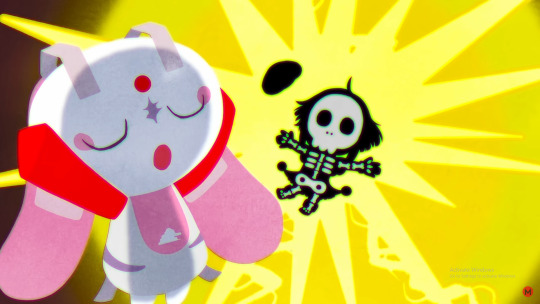
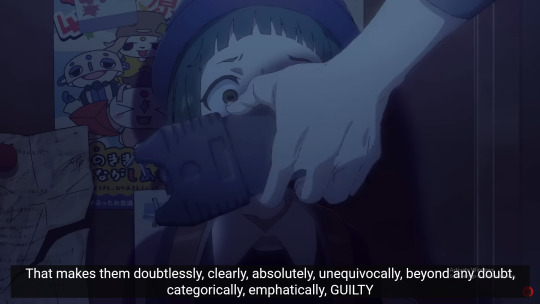
This is probably due to the rule she's associated with, as that's the rule her mom punished Amane for breaking and the rule Amane punished her for breaking.
Amane has Not acknowledged that what was done to her was Wrong, she has just acknowledged the hypocrisy of the action. Riyone is portrayed as right for punishing her since it Is her doctrine she broke, while her mom is portrayed as wrong because she was not able to live up to her own standards.
This is probably why Riyone doesn't disappear in the end. As said above, Magic plays very fast and loose with what is real and what is metaphorical. Riyone represents her mom Yes but She's more representative of the rule, a rule that Amane still (wants to) believe in it.
For now at least.
Lighting
So I haven't mentioned the stage light yet even though it's a really important part of it, it's what sets off the chain of events that end in Winged Amane. It's the most real looking thing in this entire MV.
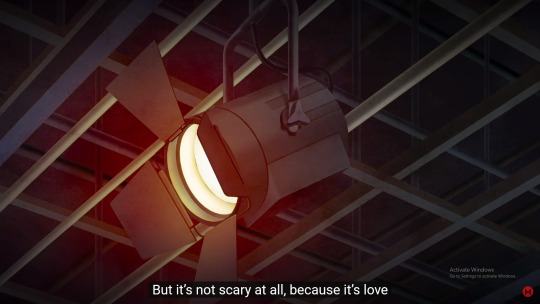
In a move I will find funny forever, this is one of the few things in Magic that doesn't seem to be connected to any specific real world event, object, or person. This stage light is most likely, purely a metaphor.
The way it disguise its nature is really interesting to me. Magic is so obviously fictional and fantasized that the real looking stage light stands out, especially since it hurts The Cat. It's unexpected and concerning, it feels out of place in this cheery world.
Except, I've mentioned it multiple times now that Magic plays fast and loose with the boundaries of fiction and reality. Magic is a show and it knows it. This Stage light was always apart of it's visual identity as a show.
This Stage light is the most obvious Show element out of everything. It's the lighting AND the inciting incident. An important backstage element and an important story element all wrapped up into one light.
This is also probably a reference to an early scene in the Truman Show.
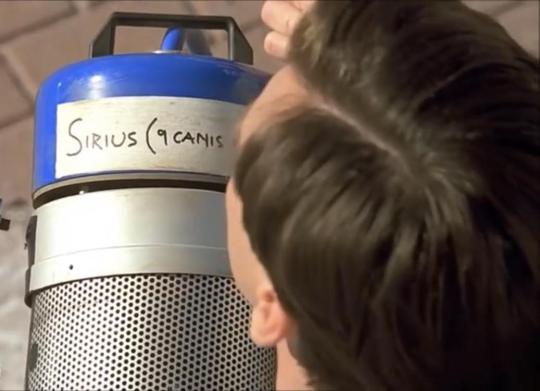
The light falling is one of the first things that clues Truman to the nature of his world. It's the inciting incident because Truman starts noticing more strange things happening in his town, and an important backstage element, a star in the sky.
Plus, the stagelight was already breaking when we see it in Magic, we can see it flicker for a few seconds before falling.


It wasn't sabotaged with the intent to hurt. The light of this world is Literally Breaking. This image of stable happiness was never going to last forever and has probably been broken multiple times in the past.
It just so happened that The Cat was the one it fell on-top of this time.
Audience
I would go into more costuming or the storybook sequences in Magic if this post wasn't already so long. I think Magic is a deeply interesting MV and honestly it doesn't even feel like I'm scratching its surface sometimes.
I sometimes call it Amane Momose's self-insert hurt/comfort fix-it-fic because that really is what Magic is. It's her fix-it fic. Her TV series. Her maladaptive daydream that makes her feel like she still Has Something to hold onto.
Even I can say "I'm sorry" Even I have hope I swear! I'm going to be a good girl now! That's it!
This is actually something she shares a bit with Fuuta but if we talked about those parallels we would be here forever and it's also very much out of the scope of this post.
But, as I mentioned, we see Amane watching it at the end. She's an audience member for her own show, detached from all the silly, empathetic, understanding, fun events going on in that world.
Amane Momose is Very Aware that the world she wants isn't real.
But even so, that Want for it to be real is going to bleed into everything.
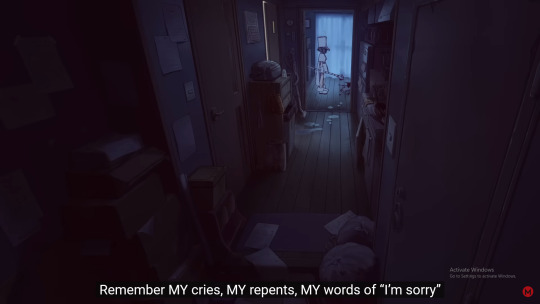
#milgram#amane momose#008#milgram amane#milgram meta#milgram analysis#cw child abuse#cw cults#I COULD GO ON ABOUT HOW PURGE MARCH TREATS ITS FICTION BUT THAT WOULD MAKE THIS SO LONG-#SOMETHING SOMETHING 'IN PURGE MARCH THE FICTION BLEEDS INTO REALITY!' SOMETHING#ITS INTERESTING BUT I WANT THIS OUT OF MY DRAFTS ITS BEEN HERE FOR A WEEK#ALSO I CONDONE THIS MURDER BTW I THINK SHE SHOULD OF KILLED EARLIER-#IM JUST SAYING THAT THE FICTIONAL AMANE IS INDICATIVE OF A DEEPER ISSUE HERE#LIKE THE ACT OF VIOLENCE IS SOMETHING SO CATHARTIC THAT AMANE CANT IMAGINE IT AS SOMETHING SHE DID-#im not writing the post in the tags here
56 notes
·
View notes
Text
that's it for chapter 3 AND the end of the very first arc! wow!! unbelievable to have made it this far already :)
so, first, here's the plan for the forseeable future: there will be a 2-3 week break between this page and chapter 4 (leaning toward 2 weeks, but it depends on how comfortable i am with my page buffer). chapter 4 is going to be a lot more chill and more of an interlude into the next arc more than anything else. i'm also planning on it being shorter than previous chapters, but we'll see if i'm able to stick to that! after chapter 4 is done getting posted, there will be a longer hiatus as i chill out a little bit, get settled into grad school, and get the next arc set up. i'll know how all this is going to look more definitively once we're a bit closer to that time.
i'm unbelievably excited for the next arc. as i've said in a previous blog post, there is a bit of a departure from what's been going on in this first arc, but that's mainly because, well. the cult's dead. all that's left is lani, who has to contend with everything that's happened here. i also realize that chapter 3 was a bit on the more serious side, but generally speaking, wthi will not be that serious all the time. the first arc was structured in a way to encapsulate all (or most) of the vibes the comic will have throughout its runtime, so i assure you we're gonna get back to there being silly moments :) . anyway uhh i got off track! the next arc is (to me) where things start getting particularly fun because i get to introduce more characters(!!) and some major plot threads. people who've been following along with wthi since i first started working on it 7 years ago are gonna recognize a lot of characters that show up! i hope you're as excited for this as i am!
lastly, i just wanted to thank you all for all the support you've given me thus far. it really makes my day to read people's comments on this since it's such an important story to me :,) . i'm especially grateful to you if you've ever recommended wthi to someone else. word of mouth is quite literally my only form of advertisement, so i appreciate it more than i could ever express.
anyway! i hope you all have a great rest of your day and week! see you in a couple weeks!!
3 notes
·
View notes